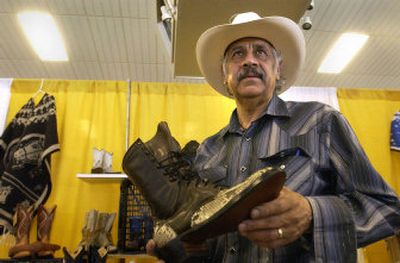Fiesta crowd thinned by immigration concerns

It wasn’t weather or any other competing events that kept attendance lower than usual at this year’s La Fiesta Cinco de Mayo Celebration in Post Falls Saturday.
It was anxiety and fear fed by a national firestorm over immigration reform, suggested Luisa Orellana, who worked at a booth at the event for Spokane’s Hispanic/Latino Resource Center. People of Hispanic or Latino heritage – even those with citizenship – are worried about becoming targets of federal raids.
“The fiesta is usually a lot bigger,” she said. “Last year by this time it was packed.”
Nevertheless, several hundred people attended the Inland Northwest’s largest festival of all things Latin. They ate homemade tacos, smashed piñatas, played soccer, listened to the booming brass of Mexican dance music, admired the lines of custom cars, caught up with old friends and shopped for distinctive clothing.
But tension is running high, Orellana said, especially with news of last week’s massive immigration raids across the Northwest. “I’m a citizen, but when I see immigration (officers) I get scared. That fear doesn’t go away.”
Margarita Vera, a journalism student at Eastern Washington University, didn’t want to think about the hard feelings being stirred up by politicians. She just wanted her kids to have an afternoon of fun. “It’s my way of showing my kids this is what we do,” she said.
Andrew Holguin, who works with the migrant community in his job at Spokane’s Inland Northwest Community Services, said he has been fielding a steady stream of calls from workers terrified of leaving their homes these days. Some are undocumented. All just want to work to feed their family, he said.
“The rhetoric is just so crazy,” he said. “The politicians could have solved this a long time ago.”
Holguin was born in the United States, but his parents were members of a tribe that has lived in Mexico’s Copper Canyon for 3,000 years. He doesn’t support illegal immigration, he said, but employers in the United States need workers, and people in Mexico are desperate to fill that gap. There ought to be a safe, regulated and legal system to allow more workers from Mexico to travel north, he said.
Peaceful immigration protests are expected nationwide Monday. Holguin said he doubts anything big will happen in Spokane, especially under the current climate of fear.
“They’re here making money. They’re not going to shoot themselves in the foot,” by appearing in public demonstrations, Holguin said. As he spoke, young children behind him swung at a piñata.
Francisca Bell and her family sold Mexican goods and clothing from a small booth at the festival. Bell’s father arrived in Spokane three decades ago. Her own children also live in the city. Despite these deep roots and her own citizenship, she said she often encounters side glances and harsh stares.
“People look at me with this judgment, ‘Are you legal?’ ” Bell said. “It’s frustrating.”
The Latino community is growing rapidly in Spokane, Bell said. She encounters many new residents in her family’s store in Spokane, La Tiendita Mexicana, at 120 N. Lee St. “They just want to work and feed their families and take a vacation once in a while,” she said.
Bell’s father, Fernando Sanchez, assisted customers in the booth, answering questions in a mix of Spanish and English. Sanchez, whose hair is now gray, crossed the Rio Grande with his parents when he was 8. “I was an illegal,” he said.
His family worked farms in Texas. For a while, they lived under a tree because they couldn’t afford to sleep under a roof. Later, he followed the jobs to Yakima, Wash. After becoming ill with tuberculosis, he landed in Spokane, where he went to school to become a shoemaker. That’s how he has made a living for the past 35 years.
“I was able to find a future,” Sanchez said.